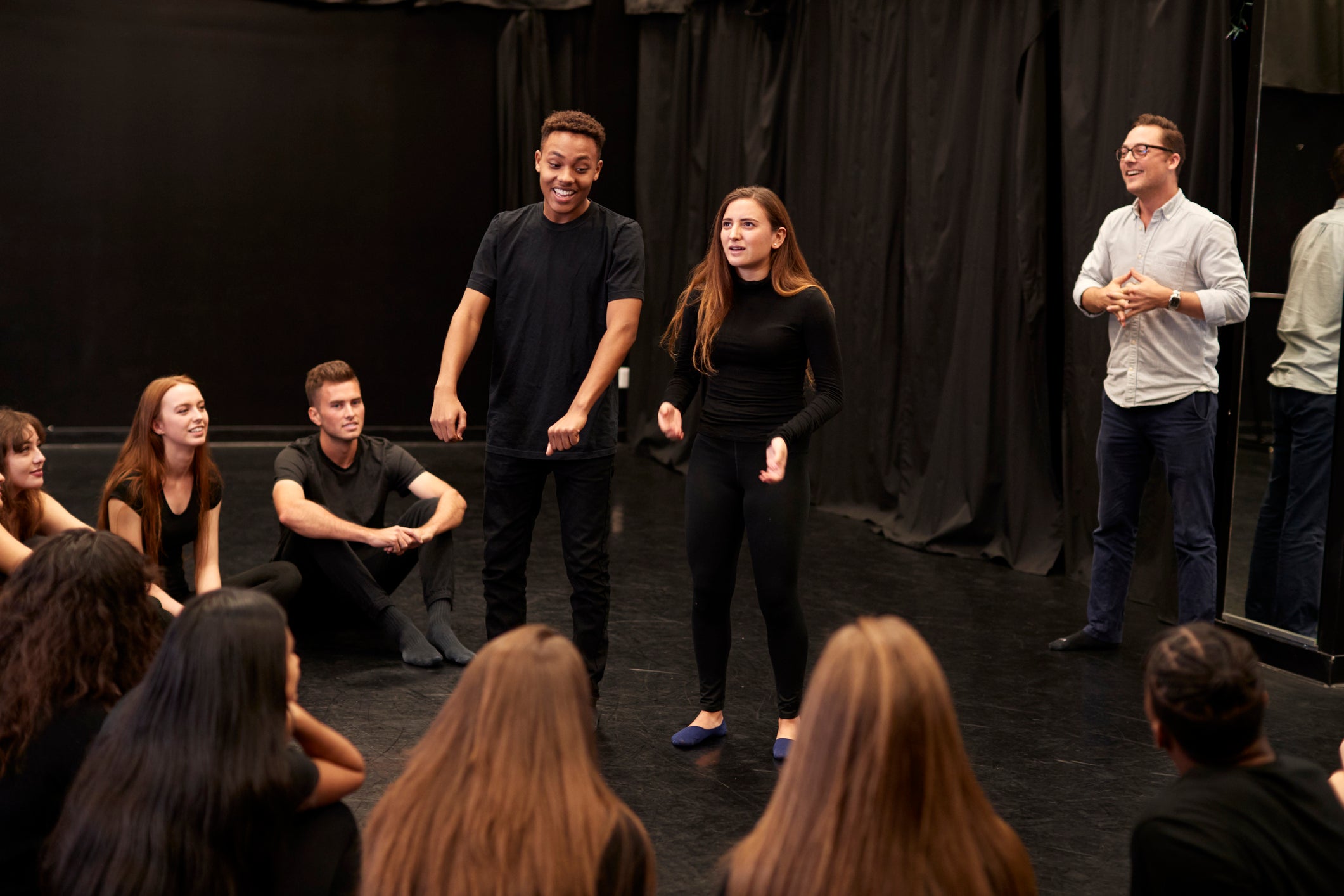I did the ‘worst value for money’ degree and it was the best decision of my career
On A-level results day each year, tallies come out calculating which university courses land graduates with the biggest pay packets and which ‘Mickey Mouse’ subjects are a waste of time. But the soft skills of an undervalued degree are priceless, argues drama graduate Helen Coffey


Every year, newspaper articles appear with headlines like “BEWARE: These Mickey Mouse degrees could RUIN your career prospects AND YOUR ENTIRE LIFE”. Every year, I quietly seethe.
For one, by the time a piece like that is published, around A-level results day, the vast majority of students have already picked their university course. What possible good can come from telling an entire fresh-faced cohort, armed with nothing but their hopes, dreams, and a carload of Ikea flatpack furniture, that they hitched their ride to a dud?
But the other more personal reason for stories like this making my blood boil is that, nigh-on 20 years ago, I chose one of the biggest “Mickey Mouse” subjects to ever grace a university prospectus: drama.
According to analysis from the jobs website Adzuna looking at the salaries of graduates, my chosen degree ranks dead last, dubbed the “worst value” of the lot. Surely not lower than graduates of the infamous “David Beckham” degree, you ask? Or surf science? Or comic and graphic novel studies? The research hasn’t looked into every obscure course offered within the UK, so perhaps we’ll never know.
What we do know is that drama grads, languishing at the very bottom of the heap, earn an average of £23,126 five years after donning a cap and gown. It perhaps wouldn’t sting quite so much were it not for the fact that all other arts and humanities-type subjects leave it in the dust, including marketing (£26,495), English lit (£26,711), fine arts (£28,575) and music (£29,162). (Marketing was a particularly bitter pill to swallow.)
Now, I can sit here proclaiming that “money isn’t everything” – and it really isn’t – as much as I like, but we all know it won’t wash. I’m speaking from a position of supreme millennial privilege.
Though I was nowhere near enjoying the free ride of my baby boomer parents, both of whom were given grants to attend uni and never had to pay back a penny, I remained in the £3,000-a-year tuition fee bracket. It seemed steep at the time, having already tripled from the £1k-per-year standard enjoyed by my older sister and her ilk; little did we know what was coming down the track.
Today, students are forced to splurge more than my entire three-year fee for just 12 months. The cost is currently capped at £9,250 a year, totalling an eye-watering £27,750 to pay back in student loans at the end of a standard three-year course.

Clearly, money does matter. Clearly, earning enough to make taking on that level of debt seem worthwhile is a reasonable goal for a grad to have. But these “Mickey Mouse” analyses, stripping life choices down to a handful of soulless bank balances, always miss out on the context and the richly complex nuances that surround the pathways we end up hurtling down in life.
At the age of 17, all I wanted was to be an actor (well, that and to have a date with Aragorn from The Lord of the Rings). I avidly read the TV guide every week as if it held the secrets to life, the universe and everything. I took note of names who were deemed “up and coming” and watched their careers “with interest” from afar as if seeing the trajectory of Romola Garai, Keira Knightley, Carey Mulligan and Helen McCrory’s successes on stage and screen could be passed to me via osmosis.
No one, but no one, could have convinced me at that point in time that acting wasn’t my destiny, or that doing a drama degree was a bad idea. In fact, our deputy head did try, pointing out that English would make me more of an “all-rounder”, and that the top universities – namely Oxford and Cambridge – didn’t even offer drama as an option.
No one could have convinced me at that point in time that acting wasn’t my destiny
Yet even before I ranged my universities in order of preference on the Ucas form, my looked-down-upon subject helped me develop real-world skills. While most of my friends simply sent off applications based on a cursory flick through a glossy brochure, all of my choices insisted prospective drama students visit for an interview. Some of these were full-day events, with practical workshops as well as one-to-ones; all involved navigating my way through a completely new city and finding enough depth and confidence to present myself, for the first time, as a fully-fledged person on the cusp of adulthood rather than a child.
“Confidence” is, in fact, the standout word I would use to sell the myriad intangible benefits of my so-called “useless” degree. My peers on other courses did the requisite growing up that comes from living away from home for the first time: learning how to wash and dry clothes, survive on pasta and pesto six nights a week, and instinctively know just how much alcohol to consume to get enjoyably hammered but not black-out drunk. Academically, they came out the other side knowing how to write well-reasoned arguments based on multiple sources with proper citations.
But confidence? Their courses were taught in packs, with whole-year lectures that saw them sprawled anonymously in back-row seats. My lot, meanwhile, were used to performing in front of our peers at will, not just acting but presenting, debating, singing, dancing. The shyness got knocked out of you after the first semester; speaking up, showing off, being loud, commanding a room and taking up space were no longer things to feel embarrassed about but things to be celebrated. The very worst prospect for those in my year of 120 students was to fade into the background, to go perennially unnoticed.

It might sound brash or “too much”, but as a formerly somewhat shy girl who was used to yielding and being spoken over, particularly by members of the opposite sex, I can scarcely think of a more valuable asset to cultivate. It’s how I got my first “proper” job in the middle of the recession after the 2008 banking crash, talking my way into becoming a workshop leader for Lewisham Council. I rocked up to the interview with the unquenchable enthusiasm of a slightly annoying golden retriever puppy and got hired above a bevy of far more experienced candidates. It’s later what would ensure I felt comfortable presenting travel videos for The Independent, hosting panels, quizzing experts, facilitating talks, occasionally appearing on TV and radio segments.
It’s come in useful in every job interview I’ve ever had and every professional role I’ve ever undertaken. There is no doubt in my mind that my career has progressed thus far – and that I’ve managed to land what I consider to be a dream job – because of the “soft” skills bestowed on me by my drama degree.
Then there’s that “worst value for money” jibe. By the third year of uni, my humanities housemates were down to two contact hours a week with staff and spent the rest of the time languishing in front of America’s Next Top Model. It was supremely unclear where their £3k was going. For all that we were the butt of jokes about getting a BA in playing games and make-believe, my fellow thesps and I were spending a minimum of nine hours a week bedded down in the drama department, switching from scripting a modern adaptation of Medea one day to learning to identify the rich political satire embedded in Restoration theatre the next.
It’s come in useful in every job interview I’ve ever had and every professional role I’ve ever undertaken
As you can likely tell from the very fact of authoring this article, I did not become an actor. But my degree was still instrumental in my current career; I discovered a latent love of writing, taking all the scriptwriting modules I could and hoovering up information about story arc and character and pacing. That love, planted deep at a suggestible age, started to grow and unfurl its branches in earnest by my mid-twenties when I finally put two and two together and realised that journalism was a career in which you could get paid to write words. Who knew?
But even if it hadn’t led me to where I am now, I still wouldn’t regret my “Mickey Mouse” degree. I’ve noticed that the subjects that commonly get branded as such – from surfing to comics and graphic novels to, yes, even David Beckham – have one massive thing in common. They all sound, well, fun. Enjoyable, even. Like something you’d look back on with genuine fondness, having pursued your passion and spent three years enthused rather than miserable.
So, though it might sound trite, I suggest following your heart when it comes to your education. Yes, a law or a business degree might get you that big paycheque sooner. But you’ve got your whole life to work – there’s nothing wrong with playing while you still can.

Join our commenting forum
Join thought-provoking conversations, follow other Independent readers and see their replies
Comments